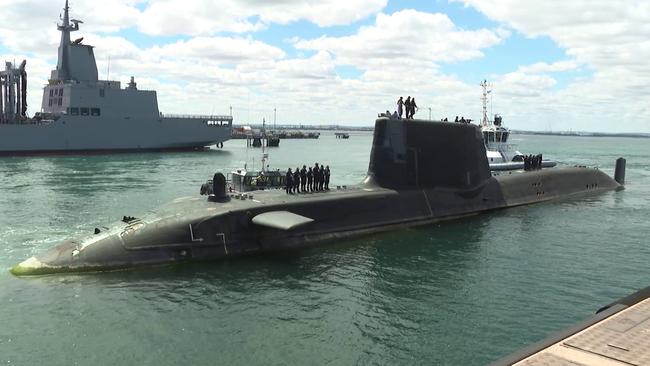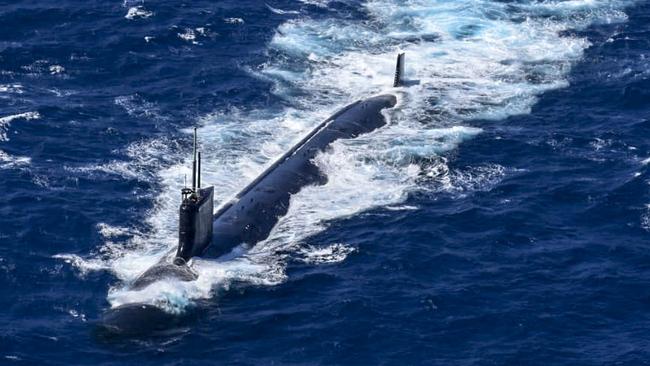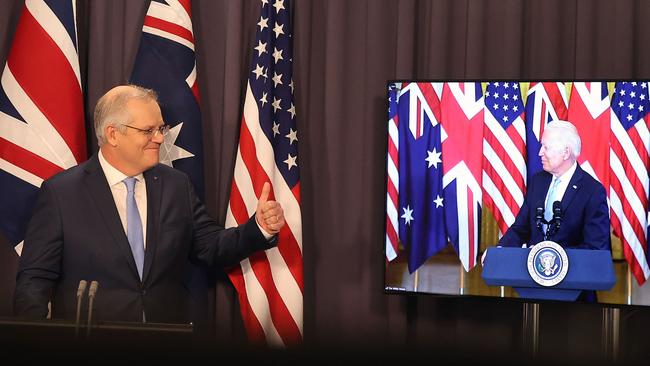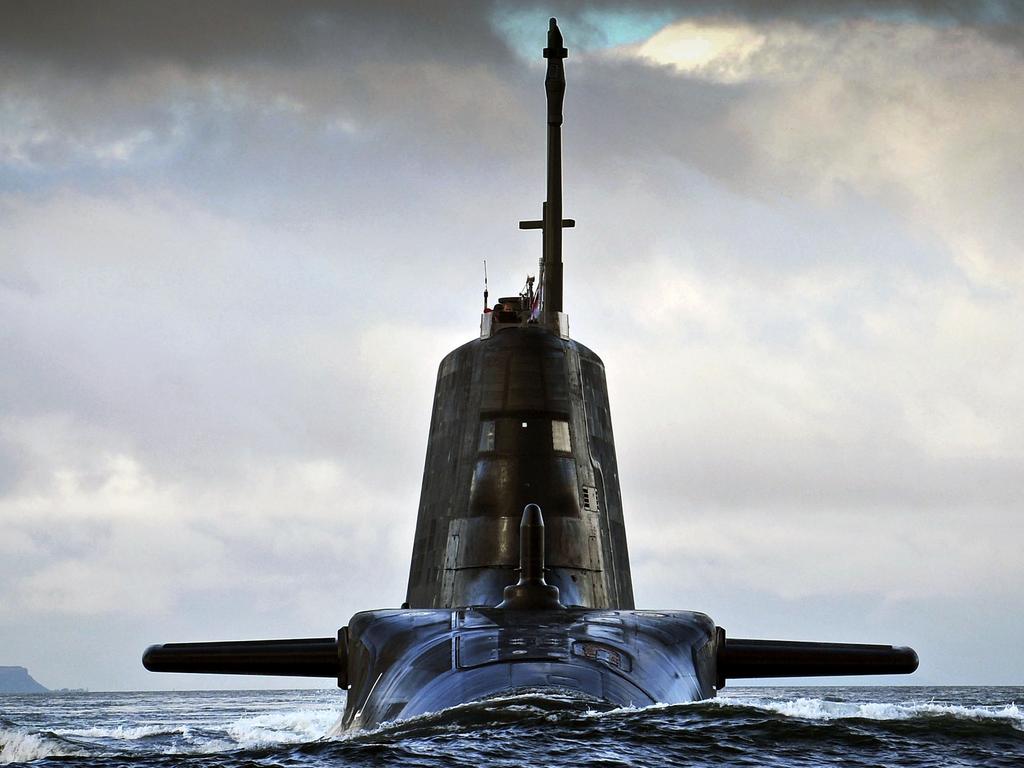Doubts are growing over whether the AUKUS nuclear subs will be locally-built
Concerns are growing that the AUKUS nuclear submarines will not be built locally, while experts are calling for clarity over a long-term industry plan.

There is growing scepticism among elements of the defence industry that the construction of the AUKUS nuclear submarines will happen in South Australia, or even Australia, with industry sources saying we should instead focus on developing major areas of expertise rather than staying wedded to the idea of a complete local build.
And while the Australian Industry Defence Network (AIDN) says it takes the federal government at its word when it says it will build the subs in Australia, chief executive Brent Clark says without a coherent industry development plan - which he has seen no evidence of to date - any such commitment is “a throwaway line’’.
The Morrison Government in September tore up French company Naval Group’s contract to build 12 conventionally-powered Attack Class submarines, replacing it with the AUKUS deal with the US and the UK to deliver at least eight nuclear-powered submarines for Australia.
Prime Minister Scott Morrison said at the time that it was “The Government’s intention is to build the nuclear-powered submarines in South Australia, maximising the use of Australian workers’’.
“Building the submarines in Australia is the best way to develop a strong and effective sustainment industry, which will enable us to meet every requirement to safely operate and maintain nuclear-powered submarines,’’ he said in a joint statement.

However with Australia lacking a nuclear industry, or any Tier-1 defence contractors to speak of, industry contacts say they are sceptical this will come to pass, and say we should instead focus on building up local areas of excellence, in turn developing local industry.
The government has put together a Nuclear-Powered Submarine Task Force, which is scheduled to report back to the government by the end of 2023 on how the subs will be delivered, and Defence Minister Peter Dutton has reiterated many times that there will not be a capability gap, on the military or he industrial side.
The head of the task force, Vice Admiral Jonathan Mead, said last year that “We will define the nuclear-powered submarine workforce, including domestic and international training and education opportunities, and identify industry, security and infrastructure requirements’’.
But Mr Clark said that task force lacked subject matter industrial experts to inform its work which was a major oversight.
One defence industry chief executive told News Corp Australia that Australia lacked a nuclear industry to feed into the project, and “I just don’t know how to get around that’’.
“I think it’s unrealistic at the moment to build a nuclear submarine in Australia in and decent timescale’’.
“The only way you’re going to get any capability prior to when you would have had it prior to when you would have had it with Naval Group is by buying, leasing, renting, whatever the term is, submarines that are already being built.
“But you get the feeling that we (industry) are not going to do terribly well out of that any time soon.’’

The parochial nature of US politics in particular meant local politicians would argue strongly for any defence work to be kept onshore there, as indeed do our own politicians.
Given that policy makers would and should be focused on the “when” of getting new submarine capability rather than the “how”, the question then swings to how can local industry best be served it was argued.
This executive argues that the nation should focus not on whether or not the subs will be locally built - which he says is unrealistic - but in building up areas of expertise so a significant sovereign capability in some areas can be built.
“The obvious way to do that is to enter into long-term partnering agreements with local companies which allows you to build up the skills and capabilities,’’ they said.
Peter Jennings from the Australian Strategic Policy Institute wrote in recent days that “The current bipartisan emphasis on building sovereign defence industry capability is a dangerous myth’’, and Australia should instead focus on becoming part of a shared industrial base across AUKUS and India and Japan.
“Delivering on the AUKUS plans for nuclear submarines, hypersonic weapons and the rest will succeed or fail based on what industry can produce,’’ he wrote.
“ My understanding is that Defence is resisting any discussion with industry on delivering AUKUS.’’
Mr Clark is more hopeful of a local build eventuating, but says the work needs to be done now to ensure it’s even possible.
He said there were a lot of people who doubted whether the submarine build would happen in Australia, and some commentators actively advocating against it in a bid to bring them onshore more quickly, which he was sceptical was a possibility.
But AIDN’s concerns laid with “why is Australia so gun-shy about creating a sovereign industrial capability? Every other country seems to be able to do it. That’s at the heart of the debate’’.
Mr Clark said with current bipartisan support for building the subs in Australia, his focus was on how they would be delivered.
“If they’re going to actually build these things in Australia, in Adelaide, they’re going to have to ensure that the Australian industrial capability is maintained,’’ he said.
“The only way to do that is to ensure the skills are developed, tested and enhanced. There needs to be a very clear plan from the government, which explains to the Australian public, how they’re going to create the sovereign industrial base that they keep talking about.
“What are you going to do at ASC to ensure the workforce gets the requisite skills to build a submarine in 10-15 years?’’
Mr Clark said “one can only assume’’ that the nuclear task force will report back on building that Australian industrial capability.
“If they don’t have a plan, then they won’t build them in Australia, and that means they’re being disingenuous.
“I’m not saying they don’t have a plan. I’m saying they haven’t told anybody what that plan is.’’
News Corp Australia reported last year that one of the reasons Naval Group lost its contract was that it “overplayed its hand’’, sheeting too much high-technology work back to French contractors - an allegation denied by the French company.
Mr Clark said with the costs of qualifying to be involved in the Naval Group project running to about $200,000, small to medium sized businesses would be wary of committing to another project without surety that the work would continue and was winnable.
Mr Clark said the government also needed to “articulate that this is not going to be an export opportunity for British and American companies’’.
Defence Minster Peter Dutton recently told the ABC a decision on which submarine Australia would buy would be made “within the next couple of months’’, which would be in time for the federal election, however this has done little to quell concerns about whether the build will go offshore.
Mr Jennings says Defence also needs to think about how to build its deterrence capabilities over a much shorter term than the decade and a half envisaged by projects such as AUKUS.
“The key aim for a review of military capabilities is to determine what can be done to build a stronger deterrence capability inside three or four years,’’ he wrote.
“The only way to do that is to latch on to current production lines in the US, Britain and Europe.
“The Prime Minister should convene an industry-AUKUS partnership. We need to harness the private sector of the AUKUS and Quad countries towards delivering new high-technology defence capabilities.’’






To join the conversation, please log in. Don't have an account? Register
Join the conversation, you are commenting as Logout